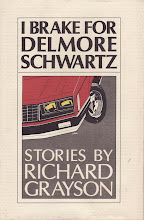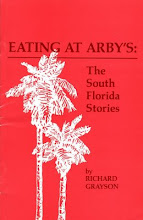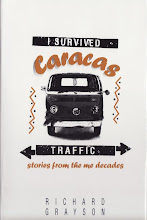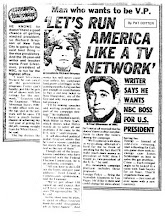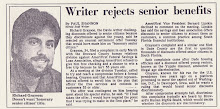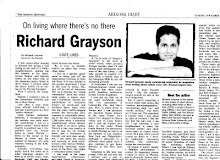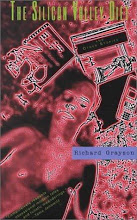
There is a feature story in the Arizona Republic today (Tuesday, January 29, 2008) about Richard Grayson and other candidates running in Arizona's Super Tuesday Democratic presidential preference primary:
Arizona makes it easy to run for president; just ask Doctress Neutopia
Richard Ruelas
The Arizona Republic
Arizona voters will face a daunting ballot on Super Tuesday. The challenge with the state's presidential preference election won't be choosing a candidate, but finding a candidate.
The Democratic and Republican ballots are stacked with 24 names each. Barack Obama, John McCain, Hillary Clinton, Mitt Romney and other recognizable names are there. But so is Sean "CF" Murphy, who gives his address as "one stone's throw from the Rillito River," and Libby Hubbard, whose first name will be listed on the ballot as "Doctress Neutopia."
It doesn't take much to get on the Arizona ballot. Print your name and address on a nomination form, sign it in front of a notary, mail the form in and you're on. You don't have to live in Arizona. You don't even have to be registered to vote.
The lax rules result in a few ambitious candidates getting themselves listed. Some are serious. Others just want to see their names alongside well-known candidates.
This year, the Tucson Weekly, an alternative newspaper, added to the confusion with "Project White House." It solicited readers to run for president and blog about the experience. It also offered to notarize the candidate forms for free. (Then again, the Secretary of State's Office will perform that same function for anyone who asks.)
That's why Jan Brewer, the holder of that office and the woman charged with running the state's elections, would like to see the Legislature adopt new rules to qualify for the ballot.
"This is something we should all take very seriously," she said. "By enabling people to get their names on the ballot just for the glory of it, it sort of circumvents the seriousness of the serious candidates that have campaigned and have issues and policies."
Brewer said it's not her job to figure out who is serious and who is joking.
The two candidates from metropolitan Phoenix illustrate the dilemma. One, Michael P. Shaw, a Republican from Glendale, has a stack of policy ideas, has made campaign trips (including to Iowa) and fervently believes in his chances of winning. Another, Richard Grayson, a Democrat from Apache Junction, is running as a joke, concurrent with his nearly non-existent campaign for Congress.
Michael P. Shaw
There is no use discussing the long odds or nearly improbable scenarios it would take for Shaw to become the next president of the United States. He knows the fight he's facing, and he isn't backing down.
"Defeat is not acceptable," Shaw said. The 36-year-old son of a minister is leaving his fate in the hands of God. "He has something he will pull out of his sleeve. You can doubt me, but don't doubt the God of Israel."
Shaw, a truck driver and former security guard, actually showed up for the drawing that determined the candidate's ballot order. Dressed in a "Geek Squad" shirt from the Best Buy electronics stores, he drew No. 6, then made a "W" with his fingers, and declared he was representing the west side.
Shaw said he believes his street credentials will help him in international affairs and in the upcoming debates, if he's invited.
"I'm from the gutter. I'm from the 'hood," he said. "Those men up there on the stage don't scare me."
Shaw said that after he got himself on the ballot, he started taking his chances of getting elected seriously.
He took a Greyhound bus to Iowa to try to drum up support in the caucus. The trip took longer than he thought it would, costing him time. He blames the bus company for his defeat there.
With no time to get his name in front of the masses necessary for victory, Shaw volunteered to help out Sen. Barack Obama, D-Ill., courting votes in the 'hoods of Iowa.
"Those few votes pushed (Obama) over," Shaw said. "I take full responsibility for the victory in Iowa for Obama."
Shaw said he has always been interested in politics, but became truly awakened after hearing the Rush Limbaugh radio program.
"I'm bringing Reaganomics back from the dead," he said, referring to the economic program of President Reagan. Shaw also wants to bring the man himself back, claiming the technology exists to create a virtual clone of the former president.
Shaw claims support from both the immigrant community and gangs from his former home cities in California and Illinois. Shaw said that if he can get enough people motivated to support him, he could start leveraging that support with Obama, possibly creating a Shaw/Obama ticket.
In the meantime, Shaw said he campaigns every day along 59th Avenue in Glendale. He also solicits donations online. "Let the people know the man needs donations," he said.
Shaw hopes to raise enough to travel the country in an 18-wheeler, which he hopes someone will donate.
"Obama wouldn't be nothing without money," Shaw said. "McCain wouldn't be nothing without money. I need the same thing they need."
Richard Grayson
Richard Grayson said he filed to run for president of the United States by mistake and worried that the mix-up will distract voters from his nearly non-existent run for Congress.
"I'm a terrible candidate," he said.
Grayson said he's running as a Democrat against Republican Rep. Jeff Flake in an attempt to get somebody better to run.
"There's been no (Democrat) running in this district since 2002, and frankly, I'm getting annoyed that I can't vote for a Democrat," he said.
Grayson said the state Democratic Party essentially has written off the Sixth District because it has such a high Republican registration rate. "It's an impossible district for a Democrat," Grayson said. "Unless (the Republican) like murdered his wife the week before, but even then, the early voting would probably get him in."
Grayson, an author and college professor who splits his time among Brooklyn, Apache Junction and Florida, has run for office several times.
His political career began in 1979 when he ran for vice president even though, constitutionally, he was too young to hold the office.
He ran for town council of Davie, Fla., in 1980, advocating that horses should get the right to vote. In 1993, he ran for Congress in Florida. In 2000, he ran for U.S. senator. He didn't win any of those elections. Not even close.
But Grayson, an author of short-story collections that have garnered favorable reviews, sees running for office as a way to make political points. His presidential run was designed to show that it's easier to get on that ballot than it is to become a candidate for Congress.
"It's kind of ridiculous that it's so easy," he said.
Now that his point is made - and he has garnered a bit of publicity - Grayson said seeing his name on the Democratic side of the ballot does not fill him with pride.
"Frankly, I feel kind of stupid," he said. "It's kind of embarrassing. I don't tell many people."









